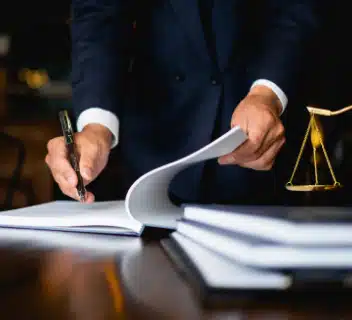Essential Tips on What Not to Say After a Car Accident: Protect Yourself
Knowing what not to say after a car accident can protect your legal rights and help you maximize your insurance claims. This guide highlights vital tips to keep you safe.
Key Takeaways
- Avoid admitting fault or making statements that could be interpreted as an admission of liability after a car accident.
- Seek medical attention immediately, even if you feel fine, and refrain from making premature statements about your condition.
- Limit conversations about the accident to basic factual details and do not discuss insurance coverage or recorded statements without legal advice.
Avoid Admitting Fault
In the immediate aftermath of a car accident, emotions run high, and it’s easy to blurt out statements that can later be used to undermine your case. To protect yourself:
- Avoid admitting fault.
- Understand that admitting fault at the accident scene can significantly impact liability and insurance claims.
- Even if you believe you may be partially responsible, remain calm.
- Avoid making any statements that could be construed as an admission of guilt while you are involved in a car.
Admissions of fault can lead to your claims being rejected or reduced. Insurance companies and legal parties involved will scrutinize every statement made at the scene. What may seem like a harmless comment could be interpreted as an admission of fault or responsibility, which can have severe legal repercussions.
Statements made at the scene can be misunderstood or misinterpreted. For instance, saying “I didn’t see you” could be taken as an admission of negligence. Instead, communicate factually, such as exchanging contact details and noting that an accident occurred and the circumstances surrounding it.
To protect yourself and avoid misinterpretation, follow these guidelines:
- Communicate factually rather than express personal sentiments.
- Stick to objective information, such as the time, place, and weather conditions.
- This approach helps to avoid any misinterpretation that could negatively affect your case.
- Staying factual and composed protects you from inadvertently admitting fault.
Don’t Say “I’m Fine” or “I Feel Fine”
A rush of adrenaline after a car accident can mask injury symptoms. Therefore, seek medical attention immediately, even if you feel fine. This ensures that any injuries, including those not immediately visible, are documented and addressed.
Many injuries from car accidents, such as whiplash or internal injuries, may not be noticeable right away and can worsen over time if untreated. Saying “I’m fine” immediately after the accident can undermine your personal injury claims later, as symptoms could develop later.
Avoid prematurely stating that you are unhurt, as this can impact your legal case should injuries arise later. Focus on getting a thorough medical examination and follow-up treatments, including medical assistance. This documentation, including your medical records, is vital for any future injury claim and ensures that you receive appropriate care for any delayed symptoms.
Refrain from Apologizing
In the heat of the moment, you might feel compelled to apologize to the other party involved in the accident. However, saying “I’m sorry” can be interpreted as an admission of fault. While expressing empathy is natural, an apology may adversely affect your liability and claims.
Instead of apologizing, follow these steps:
- Exchange necessary information with the other party.
- Cooperate with the responding officers and police officers.
- Collect contact details and insurance information.
- Document the accident scene.
- Avoid making any statements that could be construed as accepting responsibility.
Admitting fault can significantly hurt your claim, reducing its value or even preventing you from receiving compensation. Refraining from apologies protects your legal position and ensures that fault is determined through proper investigation and evidence.
Avoid Discussing Insurance Coverage Details
Discussing insurance details at the accident scene can harm your case. Here are some important points to keep in mind:
- Statements made about the accident can potentially be used against you later in the claims process.
- Discuss the accident’s details only with law enforcement.
- Share accident information only with your insurance representatives.
Conversations with the other driver’s insurance company or insurance adjusters can lead to disclosures that undermine your claims. These disclosures can be misinterpreted or used to reduce the compensation you might receive. Avoid discussing specifics about your insurance coverage at the scene, especially with the other driver’s insurer or your insurer.
When exchanging information, keep the following in mind:
- Exchange basic contact details and insurance information only.
- Avoid discussing coverage specifics to prevent statements that could negatively impact your claim.
- Limit the conversation to necessary information to protect your legal and financial interests with your insurance provider.
Don’t Give Recorded Statements Without Legal Advice
Insurance adjusters often aim to minimize payouts, making it risky to provide recorded statements without legal counsel. An insurance adjuster can manipulate statements made during recorded interviews to undermine your claim. Therefore, have legal representation when navigating these discussions.
You may unintentionally downplay your injuries in a recorded statement, which can affect your compensation. An experienced car accident lawyer and personal injury attorney can manage the case and communicate on your behalf, ensuring your rights are safeguarded. Consulting with a car accident attorney helps navigate evidentiary records and prevent problematic statements from being admitted into evidence in a personal injury lawsuit.
First-time plaintiffs may not realize what types of statements qualify as risky. Working with an attorney early in the case is critical to avoid disclosures that undermine damage claims. Seeking legal advice before giving any recorded statements protects your interests and ensures a fair claims process. Consider scheduling a free consultation to discuss your case.
Steer Clear of Speculative Statements
Making guesses about the accident can complicate legal proceedings and lead to misunderstandings. Speculative comments can negatively influence the investigation by introducing uncertainties. Focus on verified details instead of conjectures to avoid undermining the investigation.
Sticking to factual descriptions helps protect your position during legal discussions after an accident. Avoid speculative or approximating responses that can create confusion and misinterpretation regarding the accident circumstances.
Assuming a low-impact crash is harmless can lead to serious misinterpretations about potential injuries and may even result in doing the wrong thing. Avoiding speculative statements ensures that the investigation remains focused on accurate and verifiable information, which is vital for a significant difference in the fair assessment of the situation.
Avoid Saying “I’ll Settle Quickly”
Expressing a willingness to settle quickly can lead to a lower settlement offer from insurance companies. Offering to settle an accident claim too quickly can result in the insurance company presenting a lower initial offer. Insurance negotiations typically require time for a fair assessment of damages to occur.
Expressing a desire to settle fast may prompt insurers to question the validity of your insurance claim. Taking the time to thoroughly assess the damages and negotiate ensures that you receive a fair settlement.
Avoiding statements about settling quickly protects your right to full compensation. Allow the legal process to unfold and work towards a settlement that accurately reflects the damages incurred.
Don’t Downplay the Accident
Calling the accident ‘minor’ can lead to a misinterpretation of losses. Downplaying the accident’s severity can misrepresent the extent of injuries and losses. Even minor car crash incidents can cause serious accident injuries like whiplash and concussion.
Accurate reporting and proper documentation are crucial to reflecting the true nature of the accident. Providing a factual account of the accident scene ensures that all potential injuries and damages are taken into consideration. This approach helps in securing fair compensation and addressing all possible injuries in the accident report.
Summary
In summary, the statements made immediately after a car accident can significantly impact your legal and financial outcomes. Avoiding admissions of fault, seeking medical attention, refraining from apologizing, and steering clear of speculative comments are all essential steps in protecting yourself. Consulting with an experienced car accident lawyer ensures that your rights are safeguarded throughout the claims process. Contact 1-800-THE-LAW2 today for a free consultation with a car accident lawyer in our network.
Remember, the goal is to focus on factual communication and avoid making statements that could be misinterpreted or used against you. By following these tips, you can navigate the aftermath of a car accident more effectively and work towards securing fair compensation for your injuries and losses.
Frequently Asked Questions
It is crucial not to admit fault at the scene of a car accident because doing so can severely affect liability and insurance claims, potentially resulting in rejected or diminished coverage. Always focus on gathering information and reporting facts instead.
Yes, seeking medical attention after an accident is crucial, even if you feel fine, as many injuries may not show symptoms right away and can escalate if left untreated. It’s important to document any potential injuries for future reference.
Avoiding an apology after a car accident is crucial, as it can be interpreted as an admission of fault, potentially jeopardizing your liability status and diminishing your compensation. Protect your interests by refraining from expressing regret.
It’s not advisable to discuss insurance details with the other party at the scene, as it can potentially harm your case. Focus on sharing accident details only with law enforcement and your insurance representatives.
Consulting a lawyer before giving a recorded statement is essential to protect your rights and ensure that your statements are not misused against you. This legal guidance can significantly impact the outcome of your claim.




